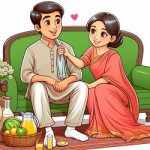Marriage and family happiness
The happiest couple I have ever seen was not on a magazine cover, not on a park bench, not in Japanese or Korean dramas, but right in my own home.
My father was in the army when he met my mother.
When he reached the age for marriage, during a visit home, my grandmother said, “I’ve found a wife for you. The bride price has been paid, so go meet her.” My mother’s parents had passed away early, and her eldest brother took on the role of head of the family.
This eldest uncle managed everything, including how much the bride price should be for my mother. When my father visited for the first time, my uncle wouldn’t allow my mother to come out to the living room and demanded an additional 50 yuan for the bride price. My father, being stubborn, turned and left, despite the pouring rain. My mother, soft-hearted, knowing the marriage was likely off, secretly took an umbrella out to send him off.
Fifty yuan was a huge sum at the time, and it seemed impossible, but my father couldn’t forget the girl with the long braids who had come to see him off in the rain. He returned home, bedridden, weeping in front of my grandmother every day. After many days of tears, he finally got some more money from my grandmother and married my mother.
At that time, my mother was still attending the only normal university in the area.
After graduation, she became a teacher. My father soon left the army and was assigned a job at a department store. Three years after they got married, I was born—a daughter. My grandmother, valuing sons over daughters, insisted on having a male heir, so despite the strict family planning policies, I was sent to the countryside, and my brother was born.
I was soon brought back home. The first home I remember was in the yard of the department store. It was a large yard, and we raised rabbits, chickens, and grew vegetables. In the summer, we played mahjong in the yard. We bought a television, and all the neighbors would come to our place to watch it.
We also lived in another apartment block for department store employees. We lived on the fourth floor. To prevent my brother and me from sneaking out to play, sometimes they would lock us in. We would put money in a bucket, lower it from the window with a rope to buy popsicles, and the popsicle vendor would take the money and put the popsicles in the bucket, which we then pulled back up.
Later on, when I started elementary school, we moved to my mother’s school dormitory. It was a beautiful place. We had a yard, and we started growing vegetables again. My brother and I began raising rabbits again. Behind the yard, there was a tall pavilion that looked like a temple. We often went there to explore and dig for treasures. We frequently found old coins and the like, which we would hide, planning to exchange them for money someday.
Then, with the reform and opening up, the government allowed the buying and selling of houses, and commodity housing became available. My parents bought one of the first batches of such homes—a three-bedroom apartment on the fifth floor. I had a room that felt very large at the time, and we lived there for a long time.
My mother loved to sing, and I remember when I was little, we often had family karaoke sessions. We’d play soundtracks on the stereo and use a microphone we bought ourselves. It was well-known that I sang the worst. My father had many hobbies; he liked to play the piano, accordion, harmonica, and practice calligraphy.
When I was very young, my mother bought a piano, probably the first piano in our area. My father, mother, and brother all learned to play. We often sang and played together, though unfortunately, I still can’t play a complete song.
On my mother’s side, my uncles started a pharmaceutical business, which unexpectedly grew very successful, expanding even overseas. My father joined them and began working out of town. I went to boarding school and, with my teenage thoughts, began to drift away from home. Later, I decided to go abroad, and saw my family less and less.
Eastern education promotes close-knit family ties, while Western education values independence for the next generation. Back then, I was determined to break free from my family’s love and control. So, I lived alone for ten years, in various rental apartments in Paris and Beijing, never returning home to live.
About four years ago, I started living with my parents again. Perhaps after being away from family for so long, I often found myself amazed watching them. They would have a little argument during lunch and make up by dinner. I marveled at how they could still quarrel after being married for so long.
At the same time, I was touched that whenever my mother went out, my father would always wait for her at the gate when it was time for her to return. Not to mention, if it was raining, he would go out early with an umbrella to meet her—something that many young couples in love today wouldn’t do.
This year marks their 33rd wedding anniversary. My father has devoted his life to my mother and the family. My mother has done the same. They have never dated or been involved with anyone else.
When it comes to retirement, my father always talks about where to go, but my mother says it’s inconvenient for transportation, then proudly adds, “We have three houses, we can live anywhere.”
The three houses, and my brother and me, are the result of their lifelong hard work.
Of course, my brother and I are more important. As someone who has always competed with my brother for their affection, I must believe I’m more important. Even now, they still rely on each other, taking walks in Chaoyang Park, going to the market together. My mother recently retired and wanted to throw a big party to celebrate. My father loves to eat and is responsible for cooking at home. My mother, always wanting to lose weight, often says, “Oh dear, you’ve cooked again.” To which my father replies, “You always say you won’t eat, but when it’s ready, you eat more than anyone.”
After retiring, my mother still helps students with piano tutoring. For a while, she was hired to teach at a private school far from home, so my father simply went to the school to stay with her. They lived happily even in the simple student dormitory.
They go online together, grow vegetables and dig pits. My mother often asks me to open a QQ space for her so she can grow vegetables for me. They plan their children’s future together. Chinese parents want to do everything—help their son buy a house, help their daughter buy a house, constantly keeping an eye on real estate developments and suitable marriage prospects among family and friends.
I am grateful to my parents for giving me a healthy body, a good education, and everything they could possibly give. When I was little, my pencil case was always the newest, my dresses were always the prettiest. When I went abroad to study, I never worked a day and was naively excited to eat at the best restaurants. I am even more grateful that they love me, respect me, and indulge my dreams—even though I know that in many ways, I am not the person they hoped I would become.
I am most grateful that through their 33 years of married life, they have taught me the best lessons in love and life. They taught me to keep my promises, to never abandon each other. They have shown me that lasting love and growing old together is possible. They taught me to believe and to persevere, that if you do, you will get the happiness you desire. In this sense, I am a very fortunate person. My family is a very happy family.
Having left home at a young age, I’ve gotten used to only sharing good news and not bad. My parents gradually came to understand that if I’m out of touch for a while, I’m probably not doing so well. But I have always had a home. They have given me the right to always be that little girl who can cry when something goes wrong, who can always make a collect call just to say, “I want to come home.” And then I know everything will be alright. I still have them. This thought makes me feel safe and happy, and I start to feel drowsy after many sleepless nights, finally falling into a peaceful sleep.
The happiest couple I have ever seen was not on a magazine cover, not on a park bench, not in Japanese or Korean dramas, but right in my own home.
Thank you for reading! ” Sitestorys “


